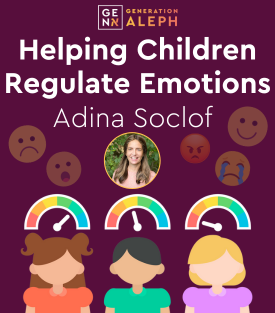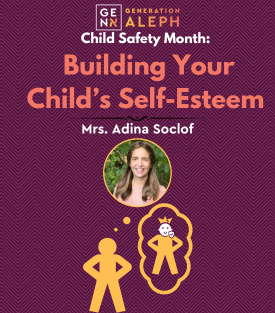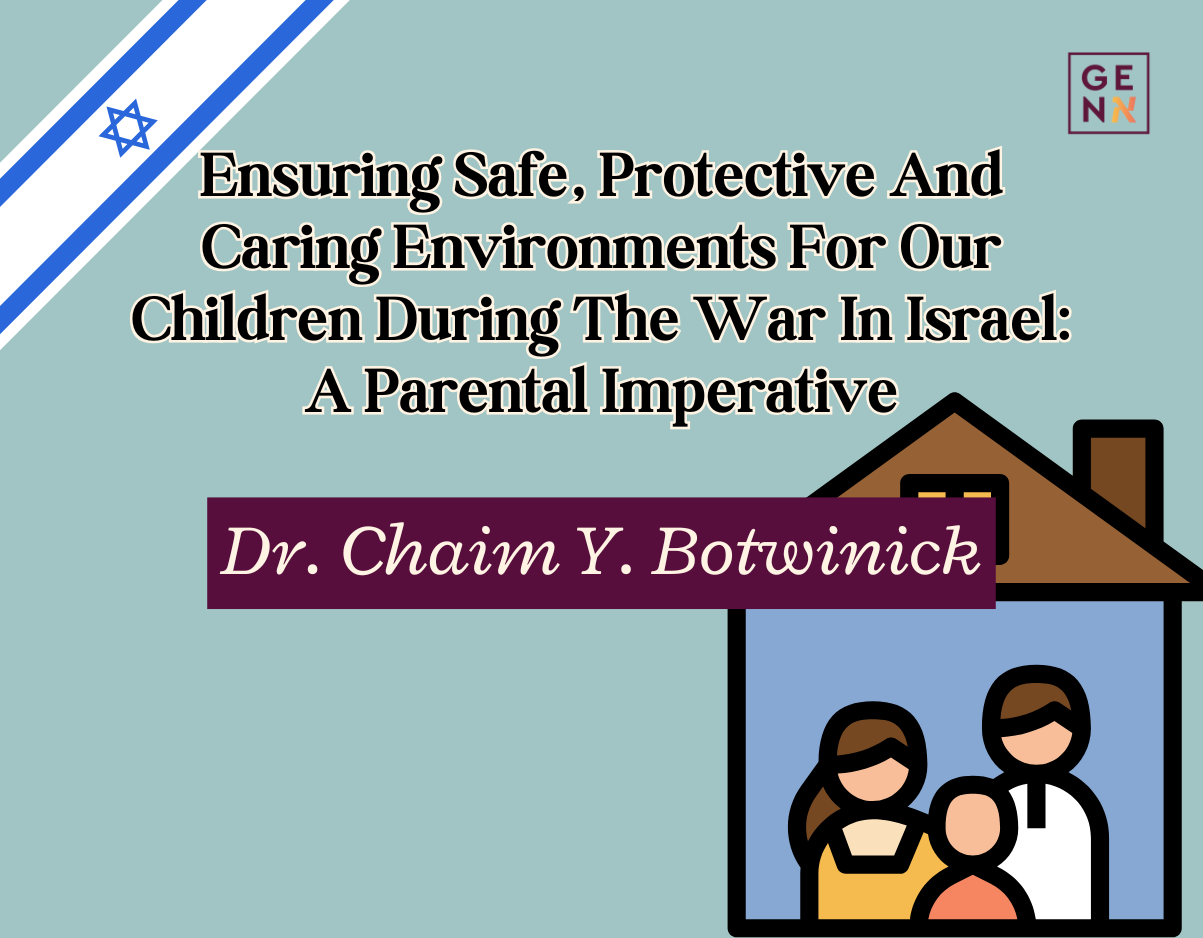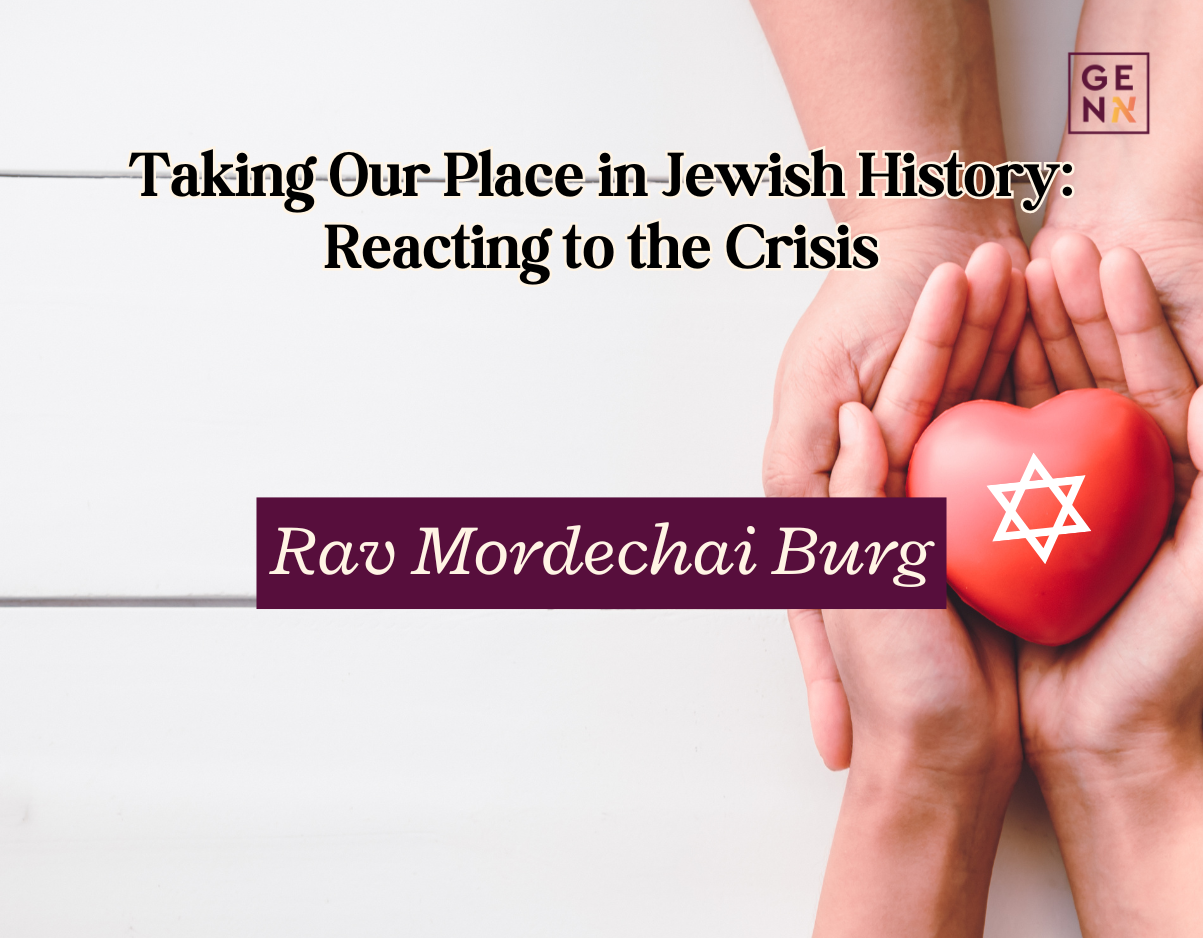Whether we live in Israel, America, or anywhere in the world, our children know that Am Yisrael is going through an incredibly difficult period. They see us crying. They feel our pain, sadness, and worry. They hear us on the phone with family members, discussing the horror and tragedy. They know that we and our loved ones are suffering.
Our children are not immune to the tragedies that have befallen our people. As parents, we must be there with them and for them as we continue to fight through these terrible times. Our kids will never forget this period of darkness, but they will also always remember how we showed up for them during this time of need.
What follows is a list of 11 practical strategies for helping our kids weather this storm. Not all of these ideas and techniques are relevant for every child. Use whatever coping skills seem applicable to your situation, and pass them on to others.
- Create safe spaces for your children to tell you what they think and feel. We must not be afraid to ask our kids how they are doing, even if that means they will share things that cause us to worry. Our children need our listening ears now more than ever. Try as best you can to remain calm and not react to what your kids tell you. The goal of listening is not to solve. Rather, it is to help our kids feel seen and understood. Let them know that you hear what they are saying and that it makes sense.
Creating a safe space entails sitting beside your child and letting them speak. Doing so shows our kids that we are strong enough to stay with them through whatever they are experiencing. Just be patient and listen with an open attitude. Remember that there is no right or wrong way for them to process the information they are hearing.
- Reassure your kids that they are safe and that you are here with them.Like all of us, our children are scared. They don’t exactly know what’s going on, and they worry about what could happen to them. They need to hear that they are not in imminent danger and a brief explanation of why that is the case. Avoid saying anything untrue or promising something you can’t deliver. Instead, tell them that they are in a safe area (hopefully they are), that brave people are protecting them right now, and that Hashem is always with them and watching over them.
- Our kids must feel we are here to hold and hug them throughout this conflict.We can stave off some of our children’s pain and loneliness by showing them we are right by their side and not going anywhere. Parental presence is one of the best predictors of childhood resilience in times of crisis.
- It is okay to cry with your kids.While we want our children to know we are strong, we can also model healthy emotional coping by showing them our humanity and sharing in their experiences of sadness and distress. Crying with your children does not mean that you are turning to them for emotional support. It just means that you are allowing them to see that you are going through this too, just like them, and that it’s okay to cry. Naming your feelings can also open the door for your kids to tell you what they’re feeling as well.
- Be honest about what’s going on.Our children hear all sorts of rumors – some true and some not. They are around other kids, overhear us talking, and are exposed to the media to some degree. We need to position ourselves as the primary sources of information for our kids, not only so that they know what to believe, but also so that we can offer them a healthy perspective on how to view these events.
When we lie to our kids (“Everything is fine. Nothing happened.”), we erode their trust in us because they know this is false. Use your judgment to provide only the information that you feel they need to hear on a level and in a way that is appropriate for their age. Young children do not need to know specific stories of what has happened (unless they ask because they’ve heard something). They need to have a general understanding of what has occurred, who was affected, and what Israel is doing to protect our friends and family.
- Tell your kids what to expect.Not being able to predict what’s coming next is very difficult and scary for a child. While we don’t know how things will unfold during this war, we do know what we plan on doing today, what we will do in the event of a siren (if you live in Israel), how we will respond if something dangerous happens, etc. Let your kids know what to expect (within reason), and answer their questions clearly, simply, and honestly, to the best of your ability.
- Maintain structure to the extent you can. So many of our lives have been shaken by this conflict. We may be having difficulty sticking to our daily routine or taking care of our usual tasks. While this is understandable, we must be mindful of our children’s need for structure and familiarity. Having a daily schedule is settling for children and helps them feel more secure. Try to have set times for waking up and going to sleep and at least one meal per day together as a family. Even if our work and school schedules have been disrupted (especially in Israel), we don’t want our home life to fall into disarray.
- Realize that your child’s reactions are normal.Kids react to crises in various ways: crying, laughing, silliness, anger, talkativeness, withdrawing, bed-wetting, night-time fears, stomachaches, hyperactivity, acting out in school, hitting their siblings, etc. All of these reactions are normal. As parents, we must not be alarmed when our kids respond in ways that are to be expected. Try to remember that these behaviors are an expression of something they are feeling underneath. If they act aggressively, encourage them to use their words instead of their fists. Correcting their behavior is appropriate; shaming them is not. The last thing we want is to make our children feel bad for reacting as kids do under these circumstances.
Encourage your kids to let out their nervousness in healthy ways. Exercise, run around outside, play ball, do gymnastics, dance, ride a bike, go for a walk with a friend. Sitting inside or being glued to a screen will not help them process the stress that is simmering in their bodies. The best way to work through stored-up tension is to shake it out by being active.
- Give your kids non-verbal ways to express themselves.Drawing and artwork are incredibly valuable ways for kids to show their thoughts and feelings. You can also suggest that your children draw pictures of Israel, the Israeli flag, or soldiers in the IDF. This can help them feel more connected to their homeland and a sense of solidarity with their people.
- Look for ways for your kids to get involved.So many of us are feeling helpless and powerless during these times. We wish there were more we could do. While we cannot personally affect change in many areas of this conflict, we can focus on our own sphere of influence. Each of us can be helpful in our communities and with the people we know. Look for ways your children can volunteer or be proactive so that they feel productive. Kids benefit from feeling like they can contribute to the overall effort. Even small acts of kindness and giving can accomplish this goal.
- Teach your children to turn to Hashem.We must remind ourselves and our kids that Hashem is here with us and is an address for us to turn to. Encourage your children to daven, say Tehilim, and speak to Hashem in their own words. The Brisker Rav, Rav Yitzchak Zev Soloveitchik, once heard terrible news and immediately asked to daven mincha. His students asked him why, to which he explained: “It’s hard for me to mean it when I cry out to Hashem during prayer. For once, I would like to cry out to Hashem and really mean it.” Now is the time to cry out to Hashem. We must teach our children that Hashem is real, that He is our Father in heaven, and that he wants us to turn him in times of distress.
It’s time to mobilize ourselves as parents and help ourselves and our children rise to meet the challenges we face. There is much that we can do to shepherd our kids through this difficult time and help them access their innate resilience. When we do, our kids and families will emerge from this terrible time stronger than ever.
Rabbi Dr. Dovid Lessin, PsyD, holds a doctorate in Clinical Psychology and is a certified psychotherapist with a private practice in Jerusalem and Modiin, Israel. He specializes in treating couples as well as adult men and adolescents. He lives in Sha’alvim with his wife, Adina, and their four children. Check out his work at https://www.lessintherapy.com
Submit your questions
"*" indicates required fields











